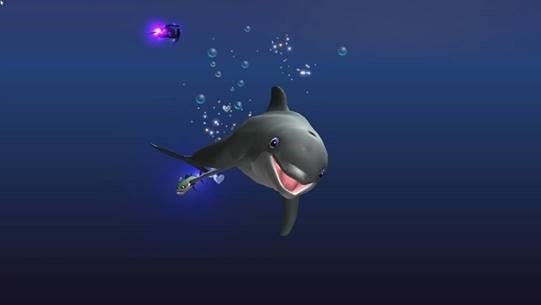STEPS Rehabilitation is now home to the world’s first immersive neuro-animation experience that delivers brain repair.
The MindPod is a digital therapeutic platform for neuro-restoration by MindMaze, a global leader in digital neuro-therapeutics solutions with a mission to accelerate the brain’s ability to recover, learn and adapt. MindPod is an immersive gaming environment for adults that involves clients controlling the movement of an animated dolphin (called Bandit) and other sea creatures, as part of their rehabilitation programme.
STEPS is using this innovative neuro-restorative digital therapeutic technology to support intensive rehabilitation for people recovering from brain injury, spinal cord injury, complex trauma injuries, and stroke. The addition of MindPod to STEPS’ extensive suite of world-class robotic and virtual reality rehabilitation technology at the centre in Sheffield, South Yorkshire, further enhances their reputation as leaders in their field.
STEPS Rehabilitation is the first facility in the north of the UK to have the pioneering MindPod technology, and one of only 2 facilities in the UK. A recently completed study shows that the MindPod doubles the effectiveness of conventional rehab for upper limb recovery in stroke, and STEPS plan to undertake new clinical studies to see how these results translate across the other client groups they treat.
About MindPod
A short video showing MindPod being used by clients at STEPS can be viewed here.
MindPod is based on technology developed in the Johns Hopkins University School of Medicine’s Department of Neurology in the United States and is backed by leading edge neuroscience. John Krakauer (MA. MD.) who is Professor of Neurology at the University is also MindMaze’s Chief Medical Advisor. He says, “The game encourages the same kind of ‘neuro-babbling’ that babies use to improve hand-eye coordination – complex exploratory movements, leveraging the cardiovascular, motor and cognitive capabilities of the person that activate key neural systems in the brain related to restoration.”
MindPod is a highly engaging animated gaming experience which promotes the recovery of motor skills and cognitive function. “It comes with an anti-gravity vest that de-weights the arm and trains fine-motor control of the upper-limb by encouraging continuous exploration of its immersive oceanic environment” says Toria Chan, Clinical Director at STEPS. “The benefit to clients is that it delivers better outcomes, because it’s engaging, motivating and fun. It enables clients to train for longer and places them in an environment where they can experience a period of temporary escapism.”
Rehabilitation robotic research
As well as bringing this pioneering technology to the clients it treats, STEPS has also partnered with both the University of Sheffield and Sheffield Hallam University to develop several clinical trials and research projects around the use of the technology. These will explore how well it can not only accelerate a person’s physical and cognitive recovery from serious neurological injuries, but also the psychological benefits of using MindPod.
“Being involved from the outset of the start of the digital therapeutics revolution the UK is extremely exciting” says Jules Leahy, Business Development Director at STEPS. “What’s truly special and unique is that this is all delivered in our purpose-built residential setting supported by our specialist team of clinicians who are experts in their field. We’re delighted that by giving clients access to this incredible technology in conjunction with everything thing else STEPS offers as a residential rehabilitation facility, we will be maximising the opportunity for each client to reach their full potential.”
Quote from a stroke client who has used MindPod
David Noblet suffered a severe stroke on 25th of November 2017. He was completely paralysed down his left side, losing two of the four lobes on the right side of his brain. David was 27, super fit and in his 3rd year at Nottingham University studying Mechanical Engineering.
He first came to STEPS as a residential client at Christmas 2017. He arrived in a wheelchair but following extensive rehabilitation he was able to walk out of STEPS at the end of February 2018. David has now graduated and working, but he continues to champion the work done at STEPS and is an Ambassador for them, helping to raise awareness of the cutting edge rehabilitation techniques and technology that is available.
David also returns from time-to-time as an outpatient and has used MindPod. “I’ve been lucky enough to be one of the first people in the UK to try this ground-breaking technology. Even after spending just 20-30 minutes on the game, the quality of rehab exercise that I was able to undertake, without really being conscious of it, was a genuine surprise and delight! Being able to lose myself in the experience, rather than consciously working parts of my body, meant I was moving in a coordinated way that I may not have ordinarily done.”
